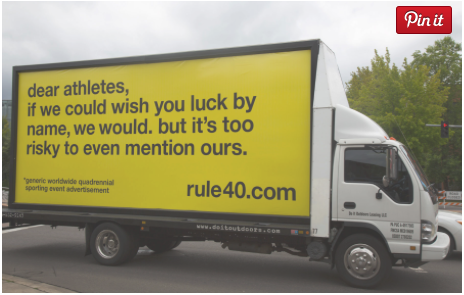The Olympics have just begun, and social media will be on fire. Unfortunately, not everyone will be able to share the excitement of the XXXI games via social media, most notably the athletes.

The Olympic Charter (the rules and guidelines for organizing and holding the Olympic Games) was first published in 1908. Adopted by the International Olympic International Committee (IOC) shortly thereafter, it encompasses the regulations for Olympic participation. The Charter serves three primary purposes:
- Documents the value of being an Olympian
- Outlines a process to resolve controversy
- Defines the relationship between the four primary constituents of the Olympics: the International Olympic Committee (IOC), the International Federations (IF), the National Olympic Committees, and the Organizing Committees for the Olympic Games.
Within the Olympic Charter resides Rule 40 which states: “Except as permitted by the IOC Executive Board, no competitor, team official or other team personnel who participates in the Olympic Games may allow his person, name, picture or sports performances to be used for advertising purposes during the Olympic Games.”
In theory, the rule was designed to inhibit the over-commercialization of the Olympics. In practice, the rule has been fairly controversial as it maximizes the earnings for the handful of official Olympic sponsors. As an athlete, the only way to earn endorsement monies is to be picked up by a recognized sponsor, who pay in excess of $100 million to participate.

Athletes who are represented by sponsors who are not officially recognized by the IOC cannot promote their sponsors during the actual games – the pivotal moment when all eyes are focused on the athlete. Given that an Olympiad’s career is relatively short and the Games occur only once every four years, the window of opportunity for an athlete to publicize their success is small.
In response to criticism, Rule 40 was recently relaxed. In a nutshell, the IOC will allow generic advertising during the games by non-official sponsors. That means an athlete can still appear in a sponsor’s ad, but the ad (including all social media content) cannot use any Olympic-branded terms. In addition, non-Olympic sponsors had to apply and receive permission to advertise by January of 2016 AND run advertising campaigns beginning the end of March.

How difficult will it be for athletes to abide by Rule 40 at the Rio Summer Games? Our prediction is that it will be extremely hard. The 2012 Games in London was the first Olympics where social media was a prominent force. Since 2012, the use of social media has exploded. So much so that several major sponsors have resorted to “training” their athletes on the correct use of social media before, during and after the Games to minimize their exposure of the IOC’s watchful eyes.
On the other hand, isn’t that why we watch the Olympics? We want to see real people excel, to witness the raw emotion as the athletes succeed as well as fail to reach their potential. Since social media is our go-to choice for sharing, it will be interesting to see how brands and athletes celebrate their victories and disappointments via social media given the highly-restrictive environment.
At Crowdynews, we salute the athletes and wish them the best as they go for the you-know-what. We’ll be following the Games on social, as well as on main stream media. You can, too.
If you’re interested in learning more about the power of social media and how who you can use it to engage your audience, please contact Crowdynews.